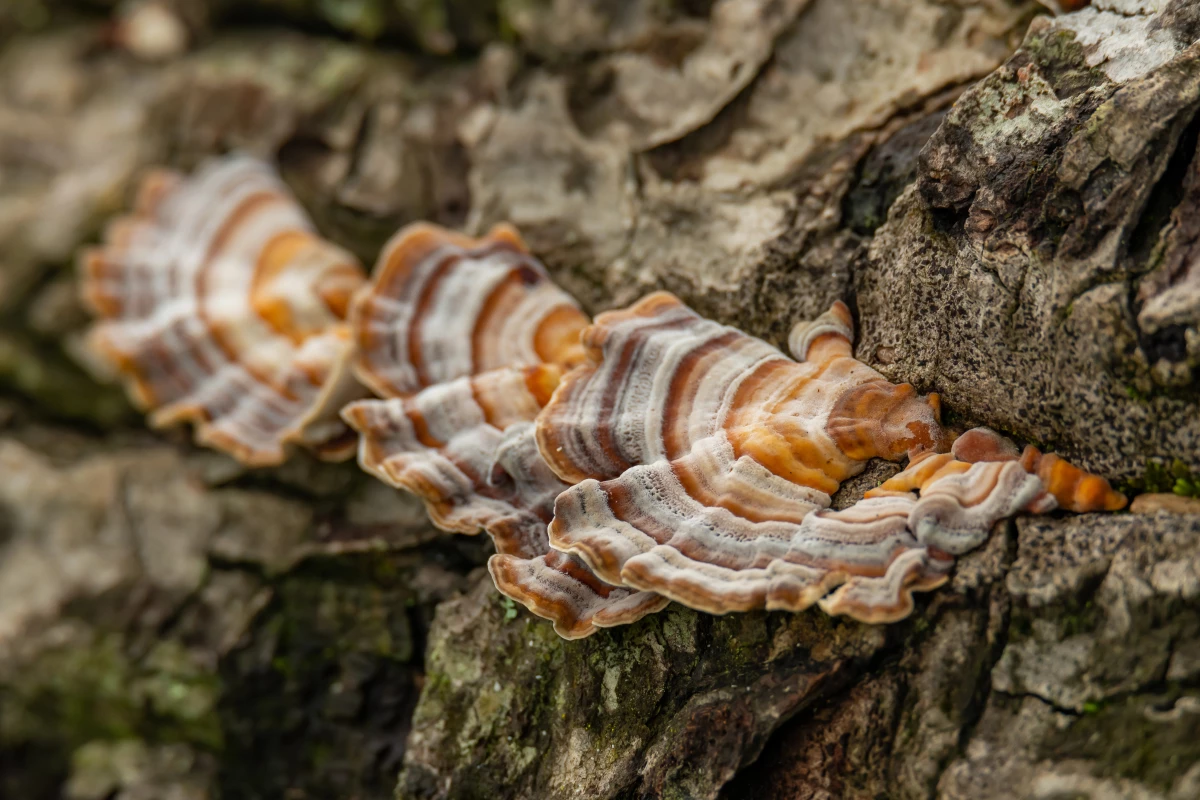Science
Turkey Tail Mushroom Offers Sustainable Alternative to Plastic Wrap

Recent research from the University of Maine presents an innovative solution to combat single-use plastic waste. Scientists have developed a natural, sustainable waterproof coating derived from turkey tail mushrooms and wood fibers. This breakthrough could serve as a viable alternative to plastic food wraps and synthetic coatings used in paper cups.
The study, published in the journal Langmuir, explores the use of the mycelium of the Trametes versicolor fungus. Mycelium, a root-like structure, grows in wood and forms a dense network of featherlike strands that exhibit natural waterproof properties. By combining this mycelium with wood cellulose fibers known as nanofibrils—commonly used in paper-making—researchers aimed to create a food-safe, environmentally friendly coating that resists water, oil, and grease.
“Our hope is that by providing more ways to potentially reduce our reliance on single-use plastics, we can help lessen the waste that ends up in landfills and the ocean,” stated Assoc. Prof. Caitlin Howell, the study’s corresponding author. “Nature offers elegant, sustainable solutions to help us get there.”
The research team applied the mushroom and wood fiber mixture in thin layers onto various substrates, including two types of paper, denim, polyester felt, and birch wood veneer. After drying for a day in an oven, the coating developed an effective waterproof barrier, comparable in thickness to paint. By the fourth day, the coating displayed distinctive yellow, orange, or tan markings.
Water droplets placed on the treated surfaces beaded up, indicating effective waterproofing. In contrast, droplets on untreated materials spread out or soaked in completely. The coating also proved successful in repelling other liquids, such as n-heptane, toluene, and castor oil, further showcasing its potential as a durable barrier.
The application of mycelium technology is not limited to food packaging. It is gaining traction in building construction as well. Experimental products include tiles made from oyster mushrooms and bamboo scraps, developed by researchers at Nanyang Technological University in Singapore. These tiles, resembling the texture of elephant skin, are designed to enhance energy efficiency and maintain cooler indoor temperatures in hot weather.
In the UK, Newcastle University is exploring mycocrete, a type of concrete that combines mycelium with grains and other bulk materials. This innovative construction material aims to be both sustainable and effective.
The findings from the University of Maine highlight the ongoing efforts to find sustainable replacements for harmful plastics and contribute to environmental conservation. As industries increasingly seek eco-friendly alternatives, the combination of natural materials like mushroom mycelium and wood fibers may pave the way for a greener future.
-

 Lifestyle4 months ago
Lifestyle4 months agoLibraries Challenge Rising E-Book Costs Amid Growing Demand
-

 Sports4 months ago
Sports4 months agoTyreek Hill Responds to Tua Tagovailoa’s Comments on Team Dynamics
-

 Sports4 months ago
Sports4 months agoLiverpool Secures Agreement to Sign Young Striker Will Wright
-

 Lifestyle4 months ago
Lifestyle4 months agoSave Your Split Tomatoes: Expert Tips for Gardeners
-

 Lifestyle4 months ago
Lifestyle4 months agoPrincess Beatrice’s Daughter Athena Joins Siblings at London Parade
-

 World4 months ago
World4 months agoWinter Storms Lash New South Wales with Snow, Flood Risks
-

 Science4 months ago
Science4 months agoTrump Administration Moves to Repeal Key Climate Regulation
-

 Science3 months ago
Science3 months agoSan Francisco Hosts Unique Contest to Identify “Performative Males”
-

 Business4 months ago
Business4 months agoSoFi Technologies Shares Slip 2% Following Insider Stock Sale
-

 Science4 months ago
Science4 months agoNew Tool Reveals Link Between Horse Coat Condition and Parasites
-

 Sports4 months ago
Sports4 months agoElon Musk Sculpture Travels From Utah to Yosemite National Park
-

 Science4 months ago
Science4 months agoNew Study Confirms Humans Transported Stonehenge Bluestones









